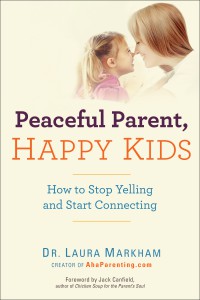An interview with Peaceful Parent, Happy Kids author, Dr. Laura Markham.
Most parenting books focus on changing the child’s behavior. But when you try to control another person’s behavior, they resist. Kids only accept our guidance to the degree that they feel connected to us. In other words, our influence with our children and our ability to guide them as they grow comes from their connection to us.
So Peaceful Parent, Happy Kids is designed to help parents stay connected as their babies grow into toddlers and then into children, and to give parents best practices to guide and coach kids, rather than control them.
Finally, this book is designed to foster emotional intelligence in both parents and children. When humans–both parents and children–are in the grip of strong emotions like anger and fear, we disconnect from each other. So one of my goals in writing this book was to help parents learn to regulate their own emotions. That enables them to stay connected even in the face of their child’s upsets and to support their child’s healthy emotional development.
What inspired you to write the book?
There are lots of good books about babies written from an attachment perspective. But once babies start to assert themselves as toddlers, parents are often challenged to stay connected and foster healthy emotional development as they set limits. The parents I work with kept asking me for a book that elaborated on what I was saying to them in coaching sessions–a blueprint for raising a happy, connected, emotionally healthy child!
How will this book benefit families?
Parents do the hardest job there is, often without the information and support they need. This book gives parents that information and support, with hands-on tools that are easy to put into practice. Parents learn to regulate their own emotions to stay calm, they learn how to stay connected even while stressed, and they learn how to help kids want to cooperate even as they grow into strong, self-directed people.
Because I’m a mom, this book is completely practical, focusing on how to transform your daily interactions with your child. Instead of tips to control or manipulate behavior with punishment and bribes, there are step-by-step recipes to coach your child’s development into a more confident, resilient, self- disciplined, emotionally intelligent person.
What are your views of Attachment Parenting International and what API is doing? How does your book work within our mission statement?
My training is an attachment theorist, so I’m a big fan of API. I love that API makes attachment parenting accessible for all families. API’s Eight Principles are brilliant because they succinctly introduce parents to the needs of children for optimal development. And, of course, since parents can only offer children what they have inside themselves, the eighth principle–balance and taking care of yourself–is critical to our ability as parents to respond with sensitivity to our children’s needs.
Lysa Parker and Barbara Nicholson’s book, Attached at the Heart, explains the Eight Principles in depth. Some of these principles, like responding with sensitivity and using positive discipline, can be hard to put into practice as your child gets into the toddler years and beyond because we as parents are only human and we get emotionally triggered. So my book gives parents the tools to put the Eight Principles into practice by regulating their own emotions and by staying connected as their baby grows into a child.
In addition, Peaceful Parent, Happy Kids extends the discussion on discipline. API advocates for loving guidance that strengthens the connection between parent and child, just as I do. Often positive discipline approaches don’t address emotion sufficiently to “work,” especially with more difficult kids. My book goes into detail on how to address the emotions that drive “bad behavior” so kids stop acting out. (“Acting out” just means acting out a feeling or need that can’t be articulated.) I know that “discipline” comes from the same word as “disciple” and means “to guide,” but any dictionary will tell you that the word has come to mean punishment. The research shows that children do need guidance and limits, but that those limits need to be set with empathy if the child is to develop self-discipline. So Peaceful Parent, Happy Kids gives parents both the theory and the practice of how to set limits with empathy, so the child WANTS to cooperate and has the self-discipline and emotional regulation to do so. With this approach, discipline is never necessary.
Is there anything else you’d like to share?
As parents, we raise the next generation. So parents deserve the support of the entire society. As Charles Raison says, “One generation full of deeply loving parents would change the brain of the next generation, and with that, the world.” I wrote this book to help all parents who read it become the mothers or fathers they aspire to be for their children.
Where can people find more information?
People can visit my website, www.ahaparenting.com.
A limited number of books can also be purchased from the API Store.

While I haven’t read this book, I’m very interested. I teach Parenting with Positive Discipline – I emphasis the connection with your child – and am interested in your additional tools around connection.